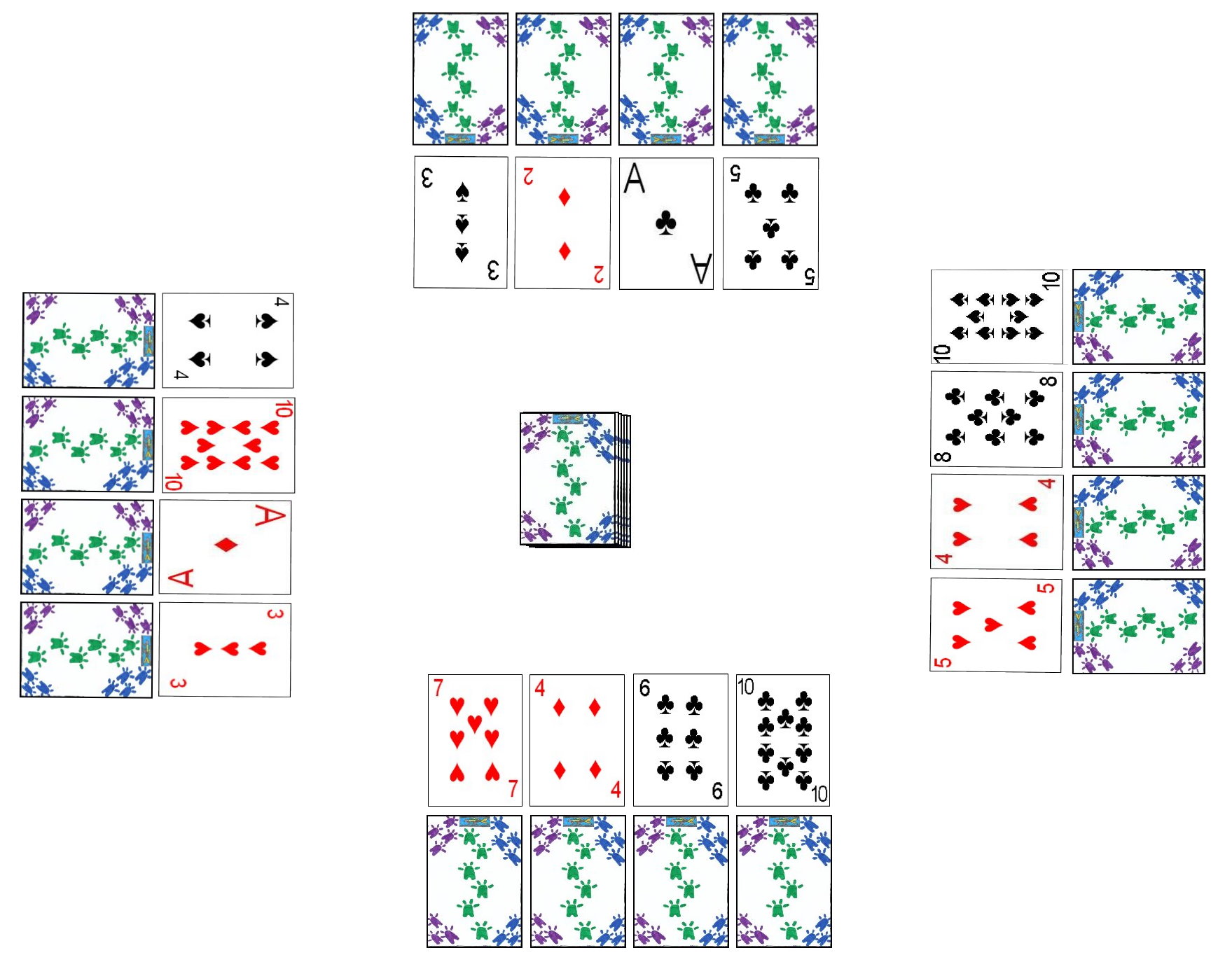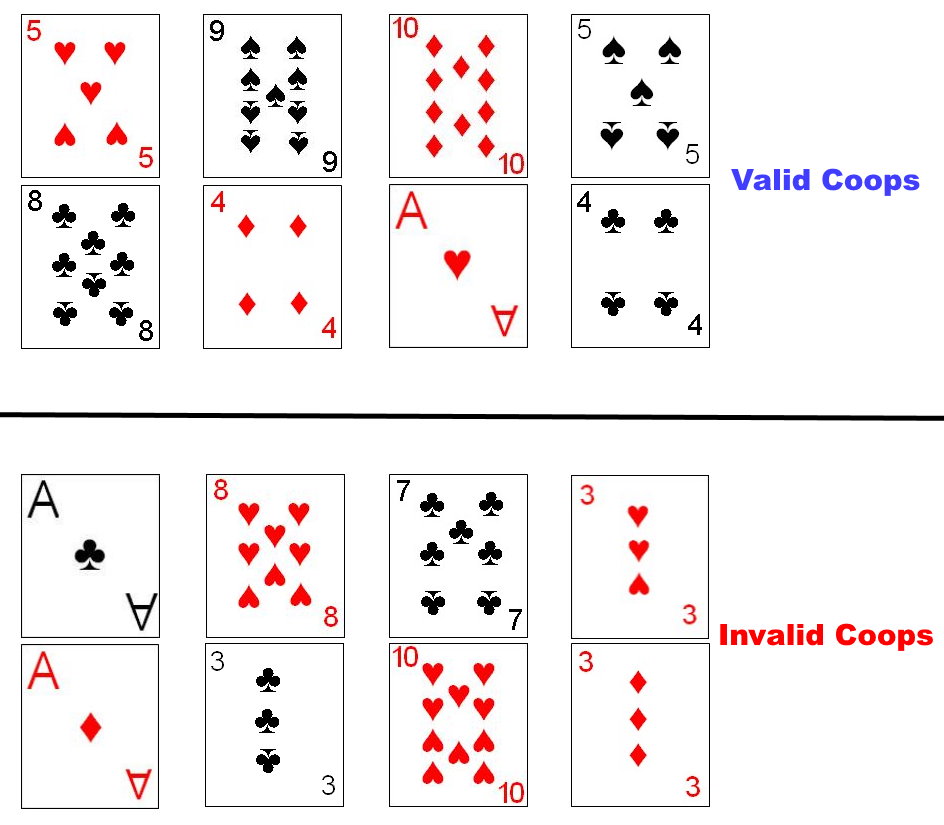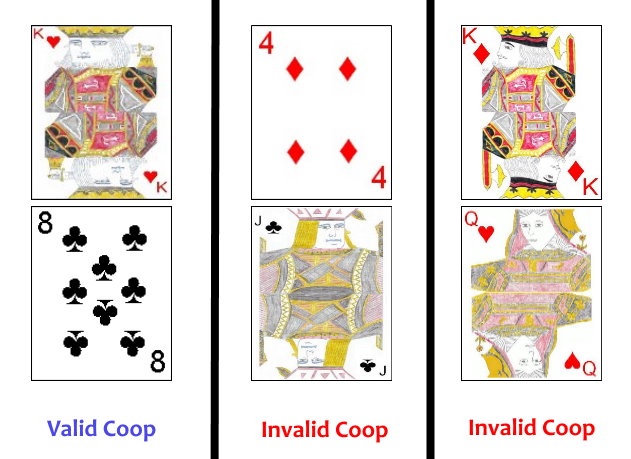 Soureh is a card game of Middle Eastern descent which was originally developed by Lior Chaga. In this game, 2, 3 or 4 players compete to complete the game with the lowest score. The game uses a special deck which is created by shuffling two standard 52 card decks together and removing all Jacks, Queens and Kings which are set aside and not used in the game. The ranking of the remaining cards in the deck are as follows, from high to low: 10, 9, 8, 7, 6, 5, 4, 3, 2, Ace.
Soureh is a card game of Middle Eastern descent which was originally developed by Lior Chaga. In this game, 2, 3 or 4 players compete to complete the game with the lowest score. The game uses a special deck which is created by shuffling two standard 52 card decks together and removing all Jacks, Queens and Kings which are set aside and not used in the game. The ranking of the remaining cards in the deck are as follows, from high to low: 10, 9, 8, 7, 6, 5, 4, 3, 2, Ace.
Determination of the first dealer and seating positions can be performed using a variety of methods, with draw for low cards a common method. Using that method each player would draw a card from the shuffled deck, seating themselves at the table in order of rank of cards drawn from lowest to highest. If two or more players draw cards of the same rank, those players would draw new cards, continuing in this manner until drawing cards which no other player has yet drawn. The player drawing the lowest card of all is designated the first dealer. After each hand, the deal rotates around the table in a clockwise direction.
After the players are seated, the dealer thoroughly shuffles the deck and offers it to the player at his right to cut. After the cut, the dealer then begins the deal. The deal consists of dealing a layout to each player which consists of eight total cards. He creates this layout by first dealing four face-down cards in a horizontal row in front of each player. After this, he then deals four more cards to that player, this time face-up with each card directly in front of each player's face-down card. Thus, the player will have four pairs of two cards, one face-up card with a face-down card in front of it. These two card layouts are each called a "coop" or "pair".
After each player has been dealt his own eight card layout in this manner, the dealer places the remainder of the deck face-down in the middle of the table as the stock. Each player is allowed to look at his own face-down cards at any time during the game, but may not look at the face-down cards of another player's layout until the end of the hand.
The player to the immediate left of the dealer has the first turn, and the turns rotate around the table in a clockwise direction. A player's turn consists of the following actions:
The player starts his turn by drawing a card from the face-down stock pile, such that only he can see the drawn card. He then has three actions he may take with this card:
- He may replace any one of his own face-down cards with the drawn card. In doing this he places the drawn card face-down in the previous cards place and places the previous face-down card in a discard pile which is found in the center of the table, to the side of the draw pile. The discarded card is placed face-up on the top of the discard pile.
- He may replace the drawn card with any opponent's face-up card. In doing this he places the drawn card face-up in the previous card's place and places the replaced card face-down to a discard pile. He may replace any of the face-up cards of the opponent with any other card, with the exception that an opponent's Ace may only be replaced with a card of rank 10.
- He may simply discard the card drawn, face-down to the discard pile.
 The goal of each player is to attempt to create valid coops with each of his two card pairs of cards. A coop is only considered valid if it fulfills specific criteria:
The goal of each player is to attempt to create valid coops with each of his two card pairs of cards. A coop is only considered valid if it fulfills specific criteria:
- If the front, face-up card is a red card (card in the suit of Diamonds or Hearts), this card must be lower than the face-down card (which can be of any suit).
- If the front, face-up card is a black card (card in the suit of Spades or Clubs), this face-up card must be higher than the face-down card (which can be of any suit).
- If either card comprising the coop is an Ace (regardless of suit or color), the other card in the same coop can be any card except another Ace.
Once each of the other players has thus had one more turn, the Soureh player then has two options. If he still has four valid Sourehs (after another player may have replaced one of his face-up cards), he declares victory for the hand, exposing all his cards to show his four valid Sourehs. However, if during play, another player managed to replace his card, causing him to have an invalid Soureh, he must simply continue playing, drawing a card and playing as normal. In that case, play continues in the usual rotation until that or another player again has four valid Sourehs, at which time he may call "Soureh" at the end of his turn, in the same manner as before. If a player does continue playing rather than exposing his cards to indicate his win, the game continues as normal, with other players free to replace that player's face-down cards on their turn as before that player had called "Soureh".
However, if the player who called "Soureh" still has four valid Sourehs after each other player has had one last turn, he exposes the cards to show his valid Sourehs and wins the hand. This player scores 0 for the hand. Each other player scores some number of penalty points for the hand which he adds to his ongoing cumulative score. These points are calculated for these other players as follows: For each set of cards the player has (once face-down and one face-up) the player selects one of the two cards (which will usually be the lower of the two cards). This value is then added to that players ongoing score. He must do this for each of his four pairs of cards, regardless of whether those cards form a valid Soureh or not. For purposes of this score each card has a scoring value equal to the face value of the card, with Aces having a scoring value of 1 point.
The game continues until one player reaches or exceeds a previously specified total, such as 250 total points. At this time, the game ends and the player with the lowest grand total is declared the overall game winner. If any player, after adding the totals from his cards at the end of a hand, reaches a total evenly divisible by 100 he may immediately subtract 50 points from his current ongoing score.
